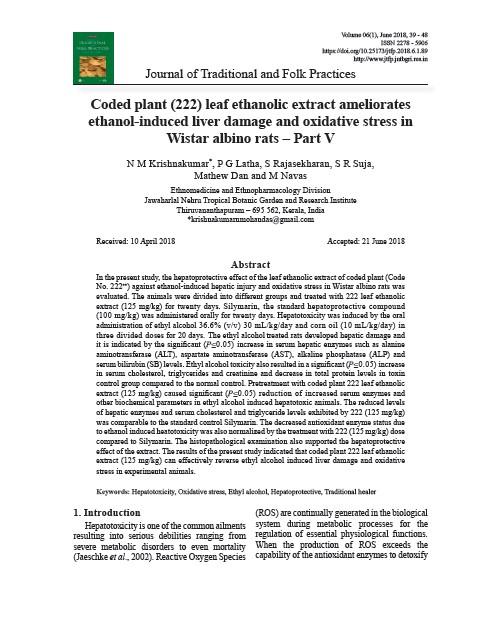Coded plant (222) leaf ethanolic extract ameliorates ethanol-induced liver damage and oxidative stress in Wistar albino rats – Part V
Keywords:
Hepatotoxicity, Oxidative stress, Ethyl alcohol, Hepatoprotective, Traditional healerAbstract
In the present study, the hepatoprotective effect of the leaf ethanolic extract of coded plant (Code No. 222**) against ethanol-induced hepatic injury and oxidative stress in Wistar albino rats was evaluated. The animals were divided into different groups and treated with 222 leaf ethanolic extract (125 mg/kg) for twenty days. Silymarin, the standard hepatoprotective compound (100 mg/kg) was administered orally for twenty days. Hepatotoxicity was induced by the oral administration of ethyl alcohol 36.6% (v/v) 30 mL/kg/day and corn oil (10 mL/kg/day) in three divided doses for 20 days. The ethyl alcohol treated rats developed hepatic damage and it is indicated by the significant (P≤0.05) increase in serum hepatic enzymes such as alanine aminotransferase (ALT), aspartate aminotransferase (AST), alkaline phosphatase (ALP) and serum bilirubin (SB) levels. Ethyl alcohol toxicity also resulted in a significant (P≤0.05) increase in serum cholesterol, triglycerides and creatinine and decrease in total protein levels in toxin control group compared to the normal control. Pretreatment with coded plant 222 leaf ethanolic extract (125 mg/kg) caused significant (P≤0.05) reduction of increased serum enzymes and other biochemical parameters in ethyl alcohol induced hepatotoxic animals. The reduced levels of hepatic enzymes and serum cholesterol and triglyceride levels exhibited by 222 (125 mg/kg) was comparable to the standard control Silymarin. The decreased antioxidant enzyme status due to ethanol induced heatotoxicity was also normalized by the treatment with 222 (125 mg/kg) dose compared to Silymarin. The histopathological examination also supported the hepatoprotective effect of the extract. The results of the present study indicated that coded plant 222 leaf ethanolic extract (125 mg/kg) can effectively reverse ethyl alcohol induced liver damage and oxidative stress in experimental animals.


